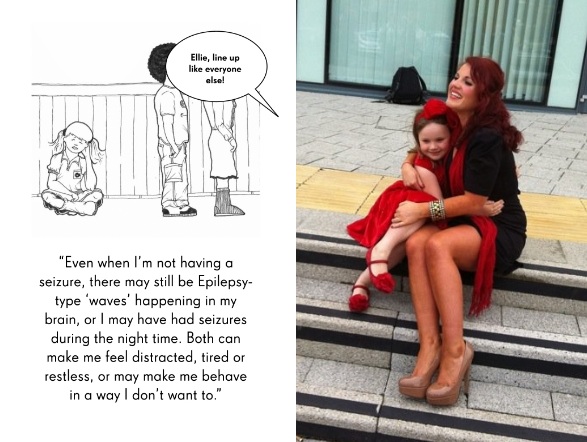Kate Lambert is a drama teacher working with young people, many of whom have special needs. Her daughter Lille was diagnosed with epilepsy at the age of five. Here, she talks about some of the misconceptions about epilepsy and how her new book, Can I tell you about Epilepsy?, will help parents, teachers and others properly deal with seizures and other issues associated with the condition.

Can you tell us a little bit about Ellie, and the other characters in your book?
Ellie is the main character in the book who invites us into her world and that of her friends who have epilepsy. Ellie and her friends represent some of the major forms of the condition. Ellie herself represents Absence Seizure epilepsy, common in children and often misdiagnosed or misunderstood. Ellie is based on my own daughter, Lille who was diagnosed with epilepsy at the age of five. Her seizures were often going unnoticed and her behaviour being labelled as other things rather than as a result of her seizures. I wanted to create a character who could simply explain the facts in black and white so that others can understand. Sometimes all that is needed for a child who has a condition is a little bit of understanding from the people around them. The other characters in the book, Ellie’s friends have different forms of epilepsy and therefore have different seizures such as tonic clonic and focal (partial) seizures.
 What are the misconceptions about Epilepsy? How can this book help?
What are the misconceptions about Epilepsy? How can this book help?
Often when people speak of epilepsy we conjur up images of full body jerky seizure known as tonic clonic seizures but this is just one form of Epilepsy. The book helps people understand the lesser known forms of the condition.
What are the top three tips you would give to teachers who have a child with Epilepsy in their class?
- I think it is very important for a teacher to acknowledge that a child may have ‘knock-on effect’ type symptoms as a cause of epilepsy or the medication that they are on and not just around the time a seizure is occurring, for example a child may be un-focused, have erratic behaviour or feel sleepy because of seizures earlier in the week. Appreciating this may help a child in your class tremendously.
- Many medications for Epilepsy can effect memory and if medicated a child in your class may have difficulty remembering data and information. Putting some simple techniques in place to help them with organisation and self management such as a checklist or allowing older children to make notes will help enormously. The seizures themselves can effect energy levels and focus too so un-medicated children may need extra help with organisation and self management too.
- It is easy to assume that with the more subtle forms of Epilepsy are more easy to ignore. Absence seizures can effect a child’s learning if they are under acknowledged. For example if a question is presented to verbally, for example what is 2 + 2+ 4=? I may hear what is 2+2 blank =? I may think that the answer is 4 instead of 8. If I get the answer wrong and have no understanding as to why, this could lead to confusion and lack of confidence surrounding the child’s learning. Visuals to support the questioning such as formula or number cards would help. It is not as easy for a child to miss things which will still be there when their seizure has ended.
What do you hope this book will teach people about how to act when someone is having a seizure?
A seizure can look very strange, dramatic or depending on the type of seizure may go un noticed to someone who has never seen one before. The book explains the signs of a seizure in its many different forms. Recognising these, will help people feel confident in how to deal with a seizure and know some basic first aid for tonic clonic seizures.
In what ways can this book be used?
The book can be used as a starting point for discussing epilepsy for parents and their children, older children and their friends or peers and teachers and their students. It may be helpful for parents to offer it to a teacher teaching their child for the first time or for professionals advising parents and other people who care for the child with epilepsy.
Copyright © Jessica Kingsley Publishers 2012.